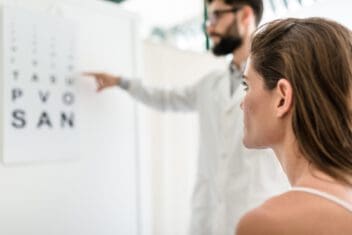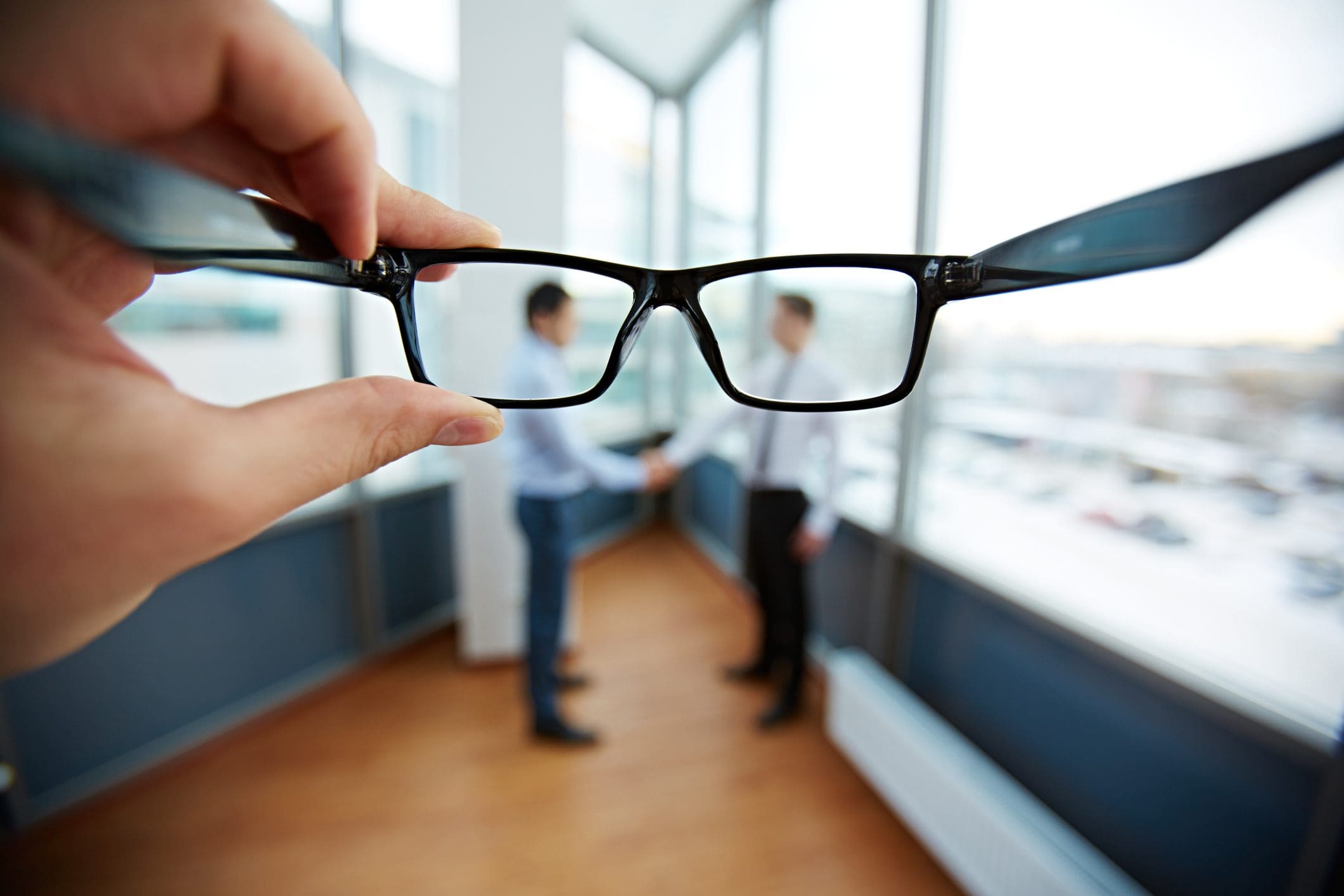What Is 20/10 Vision & How Can Someone Get It?
Home / How to Improve Your Eyesight Naturally /
Last Updated:
0/10 vision refers to a rare level of visual acuity where a person can see details at 20 feet that most individuals can only discern at 10 feet. Achieved by less than 1 percent of the population, this level of vision can be beneficial in careers such as lifeguarding or piloting, although it’s still considered more of an interesting anomaly. While there are options like LASIK surgery and brain training to improve vision, achieving 20/10 vision specifically is challenging and usually requires already good eyesight.
Table of Contents
If you have 20/10 vision, you can see details at 20 feet that people with normal vision can only see at a distance of 10 feet.
It is a rare level of visual acuity, with less than 1 percent of people achieving it. This number may eventually rise as medical science improves, but for now, it is more a beneficial and interesting anomaly than something most people will achieve.
There are options that could help some people achieve this level of vision, but you will generally already need fairly good vision if you hope to achieve 20/10 vision. Some companies offer brain training services, shown to improve vision.
Surgery can also improve vision, with LASIK often getting people to 20/20 vision or even better. Relatively new procedures with corrective lenses mean certain contact lenses offer some people quite excellent vision, although 20/10 vision specifically is still rare.
This level of vision can help in careers that require good vision, like being a lifeguard or airline pilot. It can be a positive, if potentially mild, improvement in quality of life to achieve 20/10 vision.
While 20/10 vision can be interesting to learn about, you should be realistic when seeking to improve your vision. Most people will not be able to achieve this level of vision and that is okay.
Talk to a trained specialist about the kinds of results you realistically can expect when aiming to improve your vision. Don’t forget that things like surgery carry some risks. If your vision is already fairly good, you may not want to deal with those risks for what might amount to only mild improvement.
What Is 20/10 Vision?

To understand 20/10 vision, it can be helpful to first understand what those two numbers mean. With both numbers representing distances in feet, the first number (20) is the standard distance at which you are being tested. The second number is the distance most people have to be to see at the same level of clarity you are seeing at 20 feet.
To put this all together, 20/10 vision means that you can see with clarity details at 20 feet that most people with good vision can only see within 10 feet. More simply, your vision is superior to the average person. This is all determined with a relatively simple, standardized eye test. If you are curious about your own level of vision, schedule an eye exam with an optometrist or similar licensed professional.
Not having 20/10 vision does not mean you are in any way visually impaired. Overall, 20/20 vision (where at 20 feet, you can see details most people see at that same distance) is generally a better gold standard of vision. Additionally, many people (barring certain job criteria) are able to function fine with 20/30 vision or slightly worse.
For reference, most states require you to have at least 20/40 vision or better (with corrective lenses) in order to get a driving license. Local laws can vary, however, with some areas having less strict vision requirements.
How Common Is 20/10 Vision?
Good estimates of how many people have 20/10 vision are impossible. The data pool is not large enough, and the topic is under researched. However, some experts believe about 1 percent of the population has 20/10 vision.
Even more rarely, some people have even better vision, either naturally or with training (discussed later). At least one Aborigine man reportedly achieved 20/5 vision. If true, this is an extremely impressive feat that likely involved a mix of well-trained eyes along with naturally good eyesight.
You deserve clear vision. We can help.
With 135+ locations and over 2.5 million procedures performed, our board-certified eye surgeons deliver results you can trust.
Your journey to better vision starts here.
Can You Gain 20/10 Vision With Treatment?
Very few people are born with 20/10 vision, so you may be wondering if it is possible for you to ever achieve it. For many, it will be literally impossible.
If you have seriously poor sight, there is no procedure or corrective wear that is likely to get you to 20/10 vision. You still should talk to a doctor about your options, as there may be ways to improve your eyesight, but 20/10 vision is difficult to achieve even in those with excellent vision already.
At the same time, there are some ways to improve your vision even if your eyesight is already good. Some of these methods include:
- Brain training. Some companies have developed special brain training programs to help people like athletes improve their vision. Participants go through a series of increasingly difficult exercises, essentially teaching their brains to recognize contrast and interpret information better. One major advantage to this type of treatment is there is essentially zero risk.
- Surgery. LASIK eye surgery can produce 20/20 vision or better in many patients. One study showed 90.8 percent of 56,000 cases that reported visual acuity data achieved such results. LASIK eye surgery is not without risks, although they are incredibly small. Less than 1 percent of patients see negative results to their vision.
- Corrective lenses. New technology is allowing for the creation of very precise lenses for a patient’s needs. For example, the company LaserFit claims to be able to produce contact lenses built to precise specifications. While they admit they cannot give anyone 20/10 vision, they also note many users achieve such results.

Are There Advantages to 20/10 Vision?
There are a number of professions, such as lifeguards and airline pilots, that benefit from excellent vision. Some careers may even require that a person pass a strict eye exam, although generally, it is 20/20 vision these rigorous careers ask for. Even so, 20/10 vision may prove advantageous in such a screening.
Notably, the better your vision, the more detail you see the world in. Better vision can mean a more vivid life experience. While 20/10 vision is not necessary to live a full life, it is likely to improve (if mildly) your quality of life.
How to Improve Your Vision
Working with your doctor is always advisable when you are struggling with your vision. Together, you can come up with a plan that helps you see clearly while keeping your eyes as healthy as possible. But you can support your doctor’s work with eye-healthy habits at home.
Take care of your eyes and improve your vision by:
- Addressing dry eye. When the surface of your eye lacks moisture, images can seem foggy or blurry, says Harvard Medical School. Your doctor can recommend eye drops that can keep you comfortable and seeing sharply.
- Wearing sunglasses. UV rays from the sun can spark cataract formation. Unless they are surgically removed, those cataracts can cloud your vision. Wearing protection can help you keep your eyes clear and bright.
- Eating healthy foods. Your eyes rely on good nutrition to stay healthy. A diet rich in antioxidants, including leafy greens, can provide your eyes with what they need to support clear and sharp vision.
If these steps do not help and you do feel like you need additional assistance, a conversation with your doctor is a smart next step.
Mayo Clinic points out that overcorrection with corrective lenses does not hurt the eye’s underlying structures. The step might cause discomfort in some people, and others might not get the benefits they hoped for, but it will not hurt you.
Talk with your doctor about whether this is the right move for you.
You deserve clear vision. We can help.
With 135+ locations and over 2.5 million procedures performed, our board-certified eye surgeons deliver results you can trust.
Your journey to better vision starts here.
Should You Wear Glasses or Use Contacts With 20/10 Vision?
Since your vision is exceptionally good if it’s 20/10, there is no need to wear glasses or contact lenses.
Your vision can change throughout your life, so you may need glasses or contacts at a later date if your vision deteriorates. You may experience age-related vision deterioration in the future, such as farsightedness. If this occurs, you may need reading glasses to see things up close.
Should You Medically Treat 20/10 Vision?
Many people desire 20/10 vision since it is technically better than 20/20 vision. Since this level of visual acuity is positive, there is no reason to treat 20/10 vision. In fact, many people attempt to achieve 20/10 vision via corrective eyewear or laser eye surgery.
Being Realistic
It is important to be realistic when seeking to improve your vision. There is only so much modern medical science can do for you. Achieving 20/10 vision won’t be possible for everyone. Moreover, most people don’t need that level of visual acuity.
While having superior vision to most would be advantageous, it is not necessary in most careers. Even if you desire to enter a field where excellent vision is required, be sure to temper your desire with what evidence-based medicine is available to help you achieve your goal.
There is nothing wrong with seeking to improve your vision, and it is understandable to want to see as good as possible. It is also important to remember that you must balance risk, reward, necessity, and the feasibility of your goal.
Do not seek to get 20/10 vision. Instead, seek to get the best vision you can safely get, and talk to a specialist about your options.
You deserve clear vision. We can help.
With 135+ locations and over 2.5 million procedures performed, our board-certified eye surgeons deliver results you can trust.
Your journey to better vision starts here.
References
- Visual Acuity: What Is 20/20 Vision? American Optometric Association.
- Legal Vision Requirements for Drivers in the United States. (December 2010). AMA Journal of Ethics.
- 20/10 Vision Explained and Achievable. LaserFit Lens.
- Brain Training Exercise Gives Athletes ‘Super Vision’. (May 14, 2015). Live Science.
- Lifeguard Tryouts Start Saturday. Daily Pilot.
- Comprehensive Investigation of Worldwide LASIK Research Confirms Safety, Efficacy, and Patient Satisfaction With Vision Correction and Has Improved Over Time. (September 2016). American Refractive Council.
- More Eyes With 20/10 Distance Visual Acuity at 12 Months Versus 3 Months in a Topography-Guided Excimer Laser Trial: Possible Contributing Factors. (May 2019). Journal of Cataract & Refractive Surgery.
- Uncorrected Visual Acuity Better Than 20/20 After LASIK: The Norm Not the Exception. (April 2010). Investigative Ophthalmology & Visual Science.
This content is for informational purposes only. It may have been reviewed by a licensed physician, but is not intended to serve as a substitute for professional medical advice. Always consult your healthcare provider with any health concerns. For more, read our Privacy Policy and Editorial Policy.

